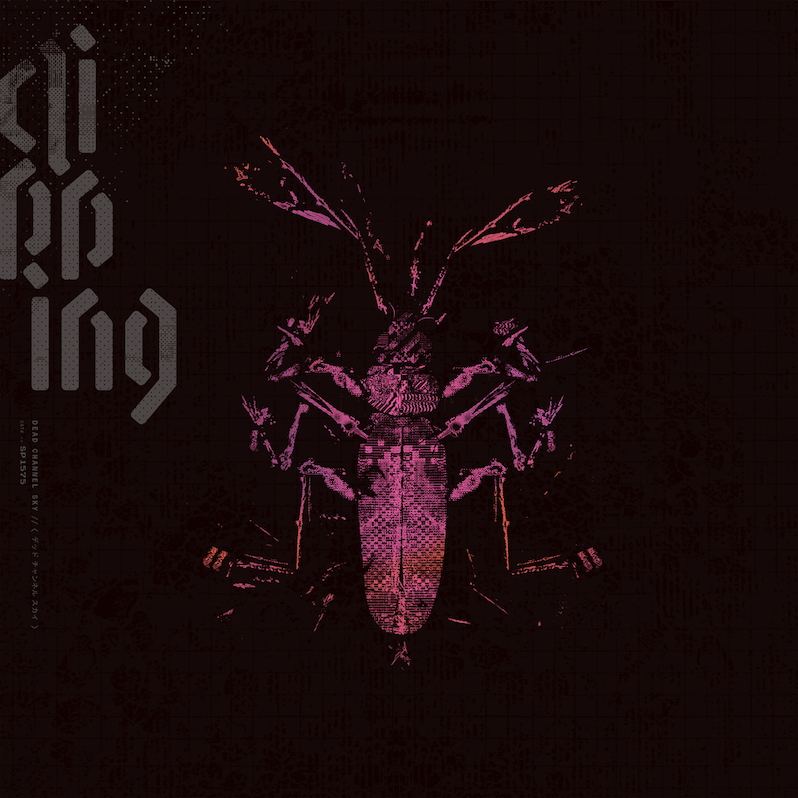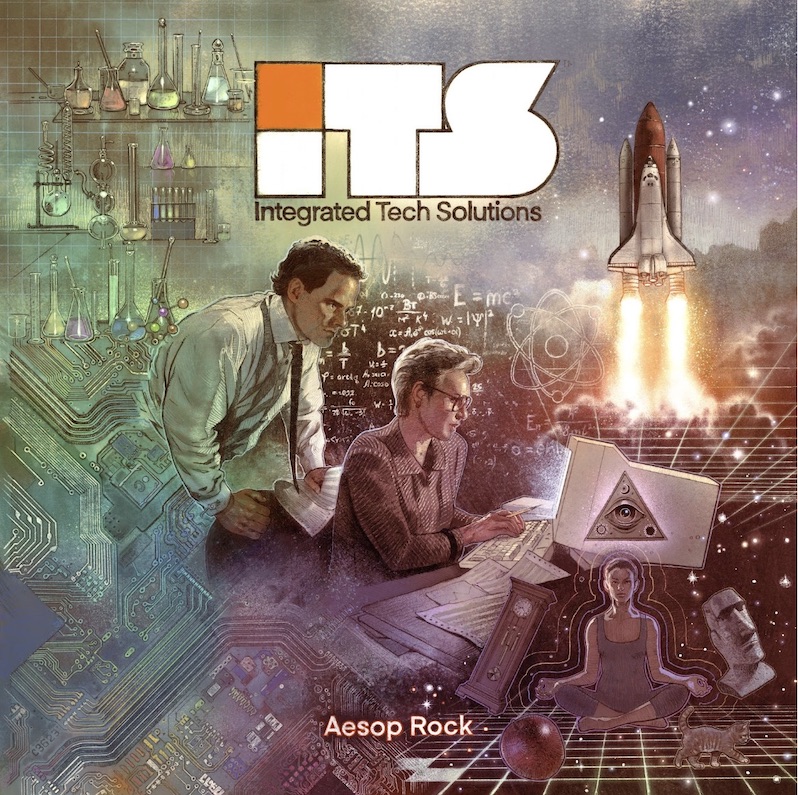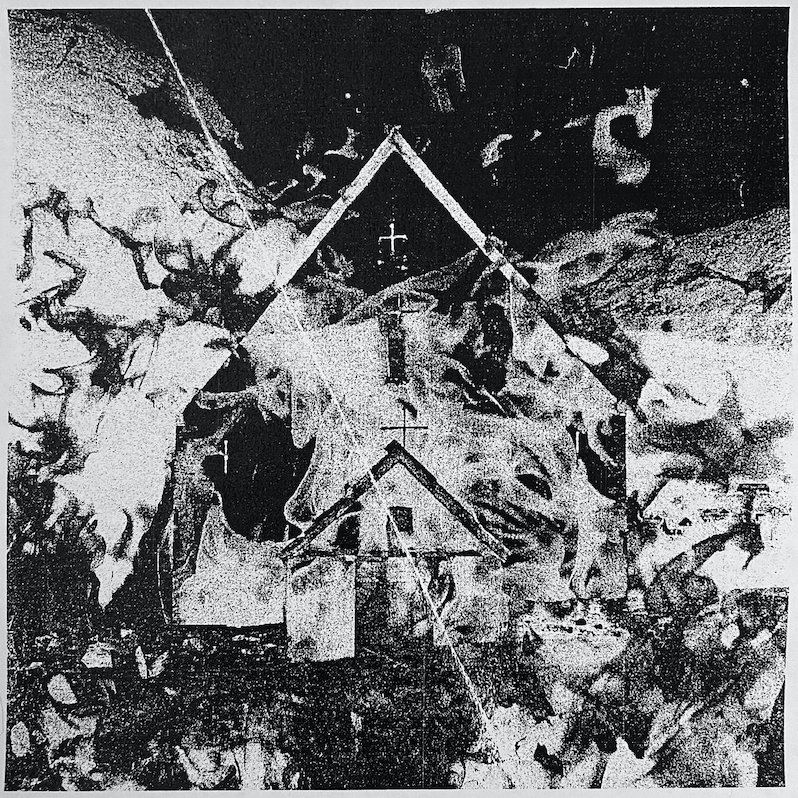clipping. : Dead Channel Sky

A rap group that can embrace horrorcore and the most extreme edges of noise and industrial while also capable of writing squeaky-clean Disney tunes is a force to be reckoned with. Since forming in 2009, clipping.—emcee Daveed Diggs with producers Jonathan Snipes and William Hutson—have consistently made music that’s difficult to pin down: is it techno, is it dance, is it industrial, is it avant-garde or experiment, cyberpunk, horrorcore, or some patchwork combination with its own unique passcode?
On Dead Channel Sky, the Los Angeles-based avant-rap group adds intense new dimensions to their sharpened wit and scathing wordplay via progressive, noise-based experimental hip-hop in a mixtape format. The album incorporates elements of horrorcore, electronic music, rave, techno, and other various micro genres, featuring contributions from the likes of Larenzo Nash from Dutch electronic group Human Resource; Aesop Rock, Tia Nomore, BitPanic, guitarist Nels Cline and Canadian hip-hop duo Cartel Madras.
One of clipping’s defining elements is the ability to zero in on the hidden gravity of using bits and notes. Dead Channel Sky uses found sounds, electronic distortion and sometimes, just the old familiar screech of a fax machine – the byproduct of dead electronic experiments. “The world of this album is one where wars are taking place all over, but unless you are directly fighting in them, you are probably not aware of how they affect you,” Diggs said in an interview with WFUV earlier this year. Dead Channel Sky is far from any idyllic existence, though not completely separated from it either.
By upsetting the usual playbook of a typical album, clipping. expand on their experimental characteristics through short slices of pure, full-spectrum sound. Like electronic bookmarks, bits of static, vocal snippets, buzzes and distorted conversations are interspersed between full-throated electronic dance songs. These interludes feel like nonsensical, emotionless walls between the heavier tracks. The manipulated vocals that appear throughout the album are high-intensity and clinically harsh. “And You Called” lives entirely inside a world of static, that no-man’s land between radio stations that you can never fully grasp. “From Bright Bodies” mashes up zips and vocal snippets, video game attacks and zooms. The “Simple Degradation” interludes feature fuzzy scratches, static and springy noise with the absence of melody or beat, raising the question of what can be considered music, with Bitpanic providing contributions to this sci-fi tangle of beeps and gurgles.
Throughout the 20 tracks, the mood shifts frantically, fed by Diggs’ tightly packed lyrics. Antiquated sounds of decaying electronic machines that will one day become unrecognizable are stacked alongside Diggs’ verses. Thoughts accumulate and spill out, unhindered by whatever the music is doing. “Dominator” uses the melody of a fax machine while sampling the Dutch electro group Human Resources.
Diggs’ Tony-award-winning talents as a rapper, actor and writer (the band is also a Hugo-Award nominee) are well served here. Diggs’ freestyle poetry and multi-layered wordplay gets room to stretch; the memorable phrase “disc, cord is dissonant” on “Dominator” is one example. Others are much more dizzying: “Stock is full of centipedes, thе renter is a rook” on “Madcap,” and “Slick as fuck, a Valdez hit a rock and the crude made the coastline to crudité,” on “Ask What Happened” are both visceral and decisive. The sheer force with which Diggs speaks is an occupational hazard for listeners. By the time your brain can filter the lines and eventually understand it, he’s already a mile down the road. Even when he raps in a monotone, the energy is directed outward like a laser beam. With such a lightning-quick delivery, syllables and spaces between words nearly fold in on one another, threatening to collapse songs’ structure.
The glossy, buzzy “Run It” changes the beat by experimenting with Diggs’ vocal delivery speed. “Go” contains more high-pitched sounds that merge into computer speak and distortion. “Change the Channel” is more techno-noise/industrial and dripping with sarcasm. The phrase “everything is very important” is a not-so-silent reminder that almost everything we think is valuable really isn’t. “Mirrorshades pt. 2” (a pseudo-duet with Cartel Madras, every bit the wordsmiths as Diggs) is a slick techno dance tune with bites and blips and a continuing melody culled from what sounds like a busy signal. “Malleus,” with Nels Cline, creates a sublayer with haywire guitar notes as an ambulance screams in the distance, then fades into soft static. “Scams,” featuring Tia Nomore, is a mashup of ‘80s techno, funk and pop beats. And “Welcome Home Warrior,” featuring Aesop Rock, is where old-school rap beats meet aggressive tech, as Aesop’s lines run smoothly through these technical walls, adding melody, more wordplay and sarcastic stream of consciousness lyrics.
There’s scarcely a misstep on Dead Channel Sky. “Madcap” features rhymes with syllables that skip and trip along over themselves, but leaves the impression the story could have had a longer journey. Chimes bring a mystical quality to “Ask What Happened,” the most emotional track here. The song develops a drumbeat like an oncoming train, and as the song’s momentum builds, so does its gravitas, like some kind of sentimental Minecraft movie laced with cynicism.
For “Polaroids,” the story of grief at a funeral, Diggs stylizes the scene like a poem, describing the soil, the hands, the “raindrops” and the “heart,” with a hardened sentimentality underneath his prose. There’s still a sense of urgency despite a life that’s ended, a lasting soliloquy for why and how we mourn. Classical elements that normally have no business being on an experimental hip-hop album show up on “Keep Pushing,” a more mainstream hip-hop with motivational lyrics that take a stab at hope, with symphonic flows and dips providing an added surge of emotion.
While most of the songs here are expressions of life’s decay and our imperviousness to it (our apparent lack of sensitivity to the world’s, and humanity’s, collapse,) “Keep Pushing” is a bright spot. The world is devolving around us—clipping seems convinced of it—but sadly, changing the channel won’t prevent that.
Label: Sub Pop
Year: 2025
Similar Albums:




